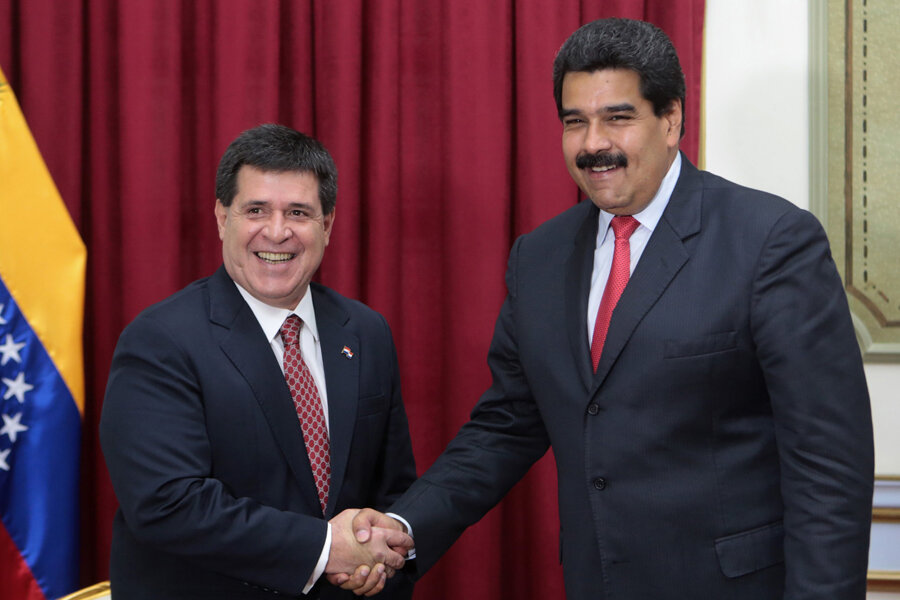Will US sanctions offer Venezuela's Maduro a helping hand?
Loading...
| Caracas, Venezuela
The US State Department's travel ban on 24 high-ranking Venezuelan officials is supposed to send a message of zero tolerance for human rights abuses. But analysts warn that the sanctions, announced Wednesday, could ultimately strengthen the hand of President Nicolás Maduro’s government.
While Congress has for months been mulling sanctions over Venezuela's suppression of anti-government protests, the Obama administration appeared to be holding out hopes that peace talks between Maduro and his opponents would bear fruit. Protests erupted earlier this year over soaring crime and economic distress.
The US and Venezuela have a rocky history: The two countries haven't shared ambassadors since 2010, and former President Hugo Chávez often blamed the "imperialists" to the north for many of the country's woes. President Maduro has also exploited anti-US sentiment to score political points, while claiming that the demonstrations are a front for his foes to topple a Socialist government.
"[The sanctions] provide yet another cover-up," for the Maduro administration, says Carlos Romero, a professor of international relations at Central University of Venezuela. Far from pushing the president towards compromise, the sanctions could help him rally his base, Mr. Romero warns. "This is a victory for the radicals."
The US hasn't named the blacklisted Venezuelan officials due to visa record confidentiality. A State Department official said the list includes cabinet members, presidential advisers, police, and military officials.
'Fractured' US policy?
The sanctions come on the heels of a diplomatic spat over the attempted extradition of former Venezuela Gen. Hugo Carvajal, accused of trafficking thousands of pounds of cocaine to the US. Carvajal was arrested last week in Aruba at the behest of the US government, only to be released days later.
In the Venezuelan telling, the timing of the sanctions speaks to US frustration over its declining influence in the region and merely scapegoats Venezuela.
At a press conference yesterday, Foreign Minister Elías Jaua called the sanctions "a desperate cry from a nation that realizes the world is changing." He added: "The US is retaliating against the role Venezuela is playing in shaping a new Latin America."
The unrest last spring left more than 40 people dead, hundreds injured, and dozens jailed, including opposition leader, Leopoldo López, who had rallied thousands of Venezuelans. While the strife in the streets has largely subsided, many US lawmakers still favor stronger action against the Venezuelan government.
"The timing is perplexing," admits Cynthia Arnson, director of the Latin American program at the Woodrow Wilson International Center for Scholars. "Yet the pressure to act [from Washington and the international community] is ongoing."
The sanctions may ease congressional pressure on the Obama administration, but some observers warn that it could still backfire.
"It reveals the fractured nature of Washington's policy toward Venezuela," says Alexander Preiss, a research associate at the Council on Hemispheric Affairs. "To some extent, it will certainly be counterproductive."







